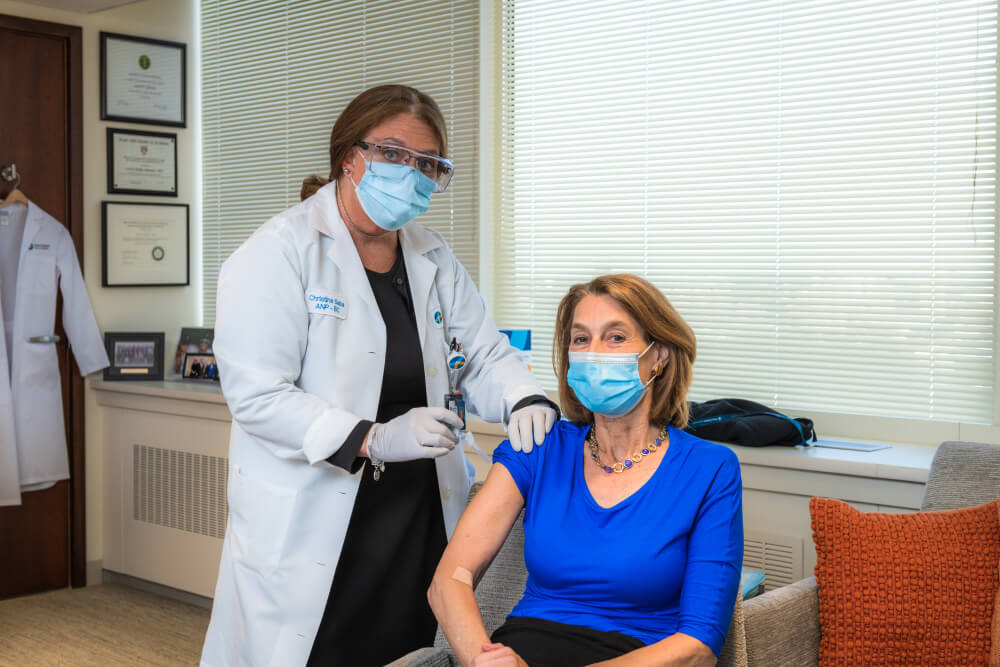A person who is immunocompromised (otherwise referred to as immunosuppressed) has a weakened immune system and a reduced ability to fight other diseases and infections, such as the common cold influenza, or COVID-19. This can be caused by various diseases and conditions, including cancer as well as various treatments for cancer, such as chemotherapy or radiation therapy.
There are different degrees of immunosuppression. Patients diagnosed with a blood cancer (such as lymphoma, leukemia, or multiple myeloma) are more immunocompromised than other patients because these cancers themselves impair the immune system. Patients who undergo a bone marrow transplant or are taking immune-suppressing drugs may also need to take more intense precautions to stay as healthy as possible.
During COVID-19, patients who are immunocompromised might be feeling more stress than normal. According to the Centers for Disease Control (CDC), people with weakened immune systems are at greater risk for severe COVID-19 infection.
Here are a few tips to keep in mind so that you can stay as healthy as possible. Remember: Don’t be afraid to ask your care team any questions.
Get vaccinated
One of the best things both patients and caregivers can do is be fully vaccinated. This is something everyone should be proactive about.
If you’re not sure whether you’re up to date, speak with your primary care doctor. If you don’t have a primary care doctor, there are still ways to get vaccinated: Most pharmacies carry the recommended vaccines for adults. Federally funded health centers and state and local health departments are can also help you determine where to get vaccinated.
[Click here for more information on where you can get vaccinated.]
Patients who are not vaccinated before a cancer diagnosis or before starting particular treatments may not be able to receive certain vaccines afterwards. If this is the case, it is even more important for everyone who will be coming in contact with the patient to be vaccinated (spouses, caregivers, children, others at home, etc.).
[Click here for the CDC’s recommended adult immunization schedule. Information regarding childhood immunizations can be found here.]
If possible, it is also highly recommended for immunocompromised patients to receive their flu vaccine every year. Doctors’ offices and most pharmacies carry the flu vaccine. Dana-Farber also has a flu vaccination program for all staff, patients, and family of patients.

Avoid exposures when possible
Another proactive approach immunosuppressed patients should take is to avoid areas of high risk for exposure to infectious pathogens. It is important to be up to date about the COVID-19 infection rates in your area. It is also crucial to maintain social distancing and be aware of those you come into contact with, even in places with lower infection rates. There is no vaccine for COVID-19 yet, so doing all that you can to keep yourself healthy is important.
Other tips for preventing COVID-19 infection include:
- Wear your mask at all times when in public.
- Wash your hands frequently for at least 20 seconds. When you wash your hands, be sure it is for at least 20 seconds and that you scrub your fingers, palms, and the backs of your hands. If you need a timer, sing the “happy birthday” song in your head twice and that will be roughly 20 seconds.
- Try to avoid touching your face when out in public.
- Try to minimize your time outside of your home.
- Avoid travel on planes and public transportation when possible.
- Avoid contact with anyone that has COVID-19 symptoms or other symptoms of sickness.
Keeping products in the home to sanitize things coming into the home, as well as frequently touched surfaces, is also recommended.
These principles can also be applied to other common infections. Flu season generally peaks between December and February. If you are unable to get a flu shot, try to avoid public places like the mall during these months, where active infective transmission is more likely. In general, those who are immunocompromised should try to minimize their time in crowded public places but especially during flu season.
It is also pertinent for patients and their caregivers to be aware of what infections are being reported in your area. If your community is suffering from an outbreak of a specific transmissible infectious disease, patients will want to minimize their exposures.
While these practices won’t prevent you from contracting an infectious disease completely, they can decrease the risk.
What to do if you think you’ve been infected
Despite your best efforts, you may come into contact with someone who is sick. If it is someone who is suspected to have COVID-19, call your doctor immediately to figure out what your next steps are.
If you have a fever or feel flushed or chilled, call your doctor immediately as well, even if it is in the middle of the night. A fever can be dangerous in immunocompromised patients, and you want to be sure the right precautions are taken.
Otherwise, know the common symptoms of an infection — and if they develop, call your doctor. Your care team is always ready to help with whatever it is you need.
About the Medical Reviewer

Dr. Antin received his MD from Cornell University in 1978, and postgraduate training in hematology and medical oncology at DFCI and Brigham and Women's Hospital. He subsequently served as director of the Bone Marrow Transplantation Service at BWH from 1987 to 1997. He now heads the Stem Cell Transplant Program of the Department of Medical Oncology at DFCI and BWH. He is a founding member and past president of the American Society of Blood and Marrow Transplantation and a past Chairman of the Steering Committee of the BMT Clinical Trial Network.
